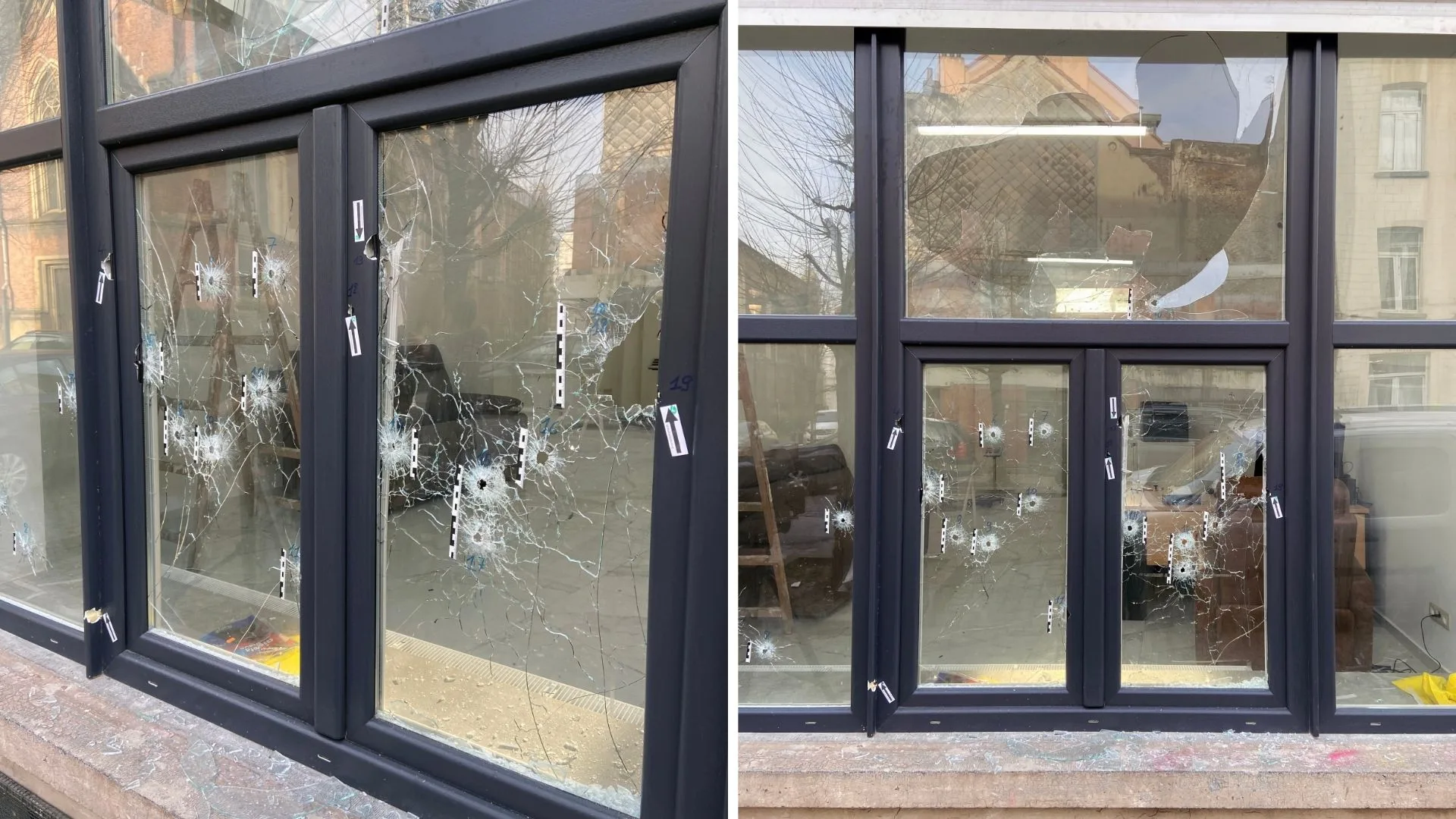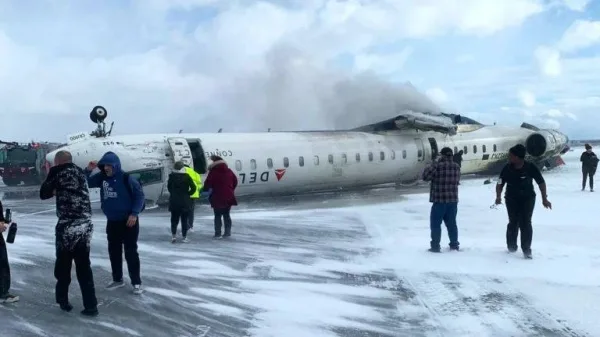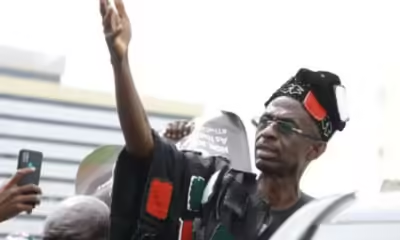World
Outgoing Belgian PM on President Trump: ‘Europe should at times show some muscle’
Published
4 months agoon

In a speech at the World Economic Forum in the Swiss town of Davos, Belgium’s outgoing Prime Minister Alexander De Croo (Flemish liberal) said that Europe should “sometimes be allowed to react a little harder” to some of the plans outlined by the new US President Donald Trump. “Greenland is part of Denmark, end of story. This is a discussion that needs to be ended”
This week Mr De Croo is spending several days in the Swiss ski resort of Davos, where the World Economic Forum is taking place. The outgoing Belgian PM will have dozens of meetings with politicians and business leaders during his time in Davos. Earlier on Tuesday Mr De Croo gave a press briefing at Belgium House, the Belgian delegation’s base for the duration of the Forum.
Inevitabily, the newly inaugurated President of the United States is a hot topic among those in Davos. Mr De Croo believes that the return of Donald Trump to the White House should push Europe to strengthen itself economically and politically. “We will be in a world where we will sometimes have to show our muscles”. He added that it is in no one’s interests to start a trade war between Europe and the US.
“However, the United States isn’t the only place in the world. The agreement with the Mercosur countries in South America is a good thing, for our country too. There is also plenty of scope for trade with India”.
“We are clear: the European market is very attractive, but access to it must be reciprocal”.
During his speech, Mr De Croo also showed understanding for the Americans’ position. In particular their concern about US’ trade deficit. He suggested that Europe could buy more of its oil and gas from America and added that some European defence spending will still go on equipment purchased from US companies.
Despite this, Mr De Croo believes that Europe should act more firmly where needs be. President Trump’s desire to annex Greenland is one example where Europe needs to take a firm stance. “It’s not something you can’t laugh off. It creates an atmosphere. We should have reacted much more firmly to it through the EU”.
-FIANDERS NEWS
You may like
World
Split US Supreme Court blocks taxpayer-funded religious charter school
Published
1 week agoon
May 23, 2025
A split U.S. Supreme Court on Thursday blocked a bid led by two Catholic dioceses to establish in Oklahoma the nation’s first taxpayer-funded religious charter school in a major case involving religious rights in American education.
With conservative Justice Amy Coney Barrett recusing herself from the case, the 4-4 ruling left intact a lower court’s decision that blocked the establishment of St. Isidore of Seville Catholic Virtual School. Oklahoma’s top court found that the proposed school would violate the U.S. Constitution’s First Amendment limits on government involvement in religion.
Barrett’s decision not to participate in the case left eight justices rather than the full slate of nine to decide the outcome. Barrett did not publicly explain her recusal but she is a former professor at Notre Dame Law School, which represents the school’s organisers.
When the Supreme Court is evenly divided, the lower court’s decision stands. The justices did not provide a rationale for their action in the unsigned ruling.
Set up as alternatives to traditional public schools, charter schools typically operate under private management and often feature small class sizes, innovative teaching styles or a particular academic focus. Charter schools are considered public schools under Oklahoma law and draw funding from the state government.
The Supreme Court has a 6-3 conservative majority. Barrett’s absence was key to the outcome in the case. The issue of the establishment of a religious charter school could return to the Supreme Court in the future to be heard before all its members.
The Supreme Court has recognised broader religious rights in a series of rulings in recent years.
During April 30 arguments in the St. Isidore case, divisions between the three liberal justices and the conservative justices who participated were laid bare as they explored the tensions between the first amendment’s two religion clauses.
Its “establishment clause” restricts government officials from establishing or endorsing any particular religion or promoting religion over non religion. Its “free exercise” clause protects the right to practice one’s religion freely, without government interference.
On balance, the five conservative justices who heard the case signaled sympathy during the arguments toward the proposed St. Isidore school, though Chief Justice John Roberts struck a note of ambivalence, posing tough questions to lawyers on both sides of the dispute.
—Reuters
World
Drug violence in Brussels: House shot at 23 times in Anderlecht
Published
3 months agoon
February 21, 2025
A house in the Brussels municipality of Anderlecht was shot at in the early hours of Wednesday morning.
The shooting occurred at 1:40 a.m. on the facade of a building, composed of a professional room and a dwelling, near Place Lemmens in Anderlecht, the Brussels Public Prosecutor’s Office has now confirmed.
Initial reports suggested that the shooting took place on the corner Place Clemenceau, but the scene was later confirmed to be about a ten minutes’ walk away.
The Brussels Public Prosecutor also confirmed that 23 bullet holes and two failed molotov cocktails had been found at the scene. Initial unconfirmed reports suggested 15 shots and one molotov cocktail had been found.
It is not yet known whether there is a link with the shootings that took place in the past few days on Saint-Guidon Square, or with previous shootings at the Clemenceau metro station and in the Peterbos neighbourhood in Anderlecht.
Since the beginning of February, those shootings, linked to the drug environment, have already left two dead and three wounded.
World
Passengers on crashed Toronto plane offered US$30,000 each
Published
3 months agoon
February 21, 2025
DELTA Air Lines is offering US$30,000 (£23,792) to each person on board a plane that crash-landed in Toronto on Monday – all of whom survived.
As it landed in the Canadian city, the plane skidded along the runway in flames before flipping over and coming to a halt upside down. Passengers described their amazement as most of them walked away without injuries.
It remains unclear what caused the incident, which is under investigation.
There were 76 passengers and four crew on the flight, which had travelled from the US city of Minneapolis before making its crash-landing in Canada.
A spokesperson for Delta said the money offer had no strings attached and did not affect customers’ rights.
The plane crew and emergency responders were praised for their quick work in removing people from the wrecked vehicle. The plane’s various safety features have also been credited for ensuring no loss of life.
All but one of the 21 passengers who were taken to hospital had been released by Wednesday morning, the airline said.
Delta’s chief told BBC’s US partner CBS News that the flight crew were experienced and trained for any condition.
The airline’s head Ed Bastian told CBS the plane crew had “performed heroically, but also as expected”, given that “safety is embedded into our system”. He said Delta was continuing to support those affected.
Several theories about what caused the crash have been suggested to the BBC by experts who reviewed footage, including that harsh winter weather and a rapid rate of descent played a role.
One passenger recalled “a very forceful event”, and the sound of “concrete and metal” at the moment of impact. Another said passengers were left hanging upside down in their seats “like bats”.
The cockpit voice recorder and flight data recorder have been recovered from the wreckage. The investigation is being led by Canada’s Transportation Safety Board (TSB), supported by US officials.
The accident was the fourth major air incident in North America in a space of three weeks – and was followed on Wednesday by a crash in Arizona in which two people lost their lives when their small planes collided.
Experts continue to insist that air travel is overwhelmingly safe – more so than other forms of transport, in fact.
That message was emphasised by US Secretary of Transportation Sean Duffy, who told CBS on Wednesday there was no pattern behind the incidents, each of which he said was “very unique”. -BBC

60 beekeepers trained in Volta, Oti regions

Dagbon bows in majesty to bid farewell to Late Mion Lana

GTA official honoured for outstanding support to TOUGHA
Trending

 Politics9 months ago
Politics9 months agoVoter Register Discrepancies: NDC to stage nationwide protests against EC

 News10 months ago
News10 months agoArise Royals Montessori School Marks 2nd Graduation.

 News6 months ago
News6 months agoKing of Igbo Community in Ghana congratulates Mahama as President-elect of Ghana.

 Entertainment11 months ago
Entertainment11 months agoGhanaian musician Champions Gaza Peace with New Track

 More10 months ago
More10 months agoYoung people urged to develop their talents

 News11 months ago
News11 months agoCancer Support Network Foundation holds gala

 Entertainment11 months ago
Entertainment11 months agoSteps to receive an official GWR certificate – Details from mother of a Ghanaian record holder

 Women & Children10 months ago
Women & Children10 months agoPlan International Ghana Celebrates Milestone in Women’s Empowerment

















